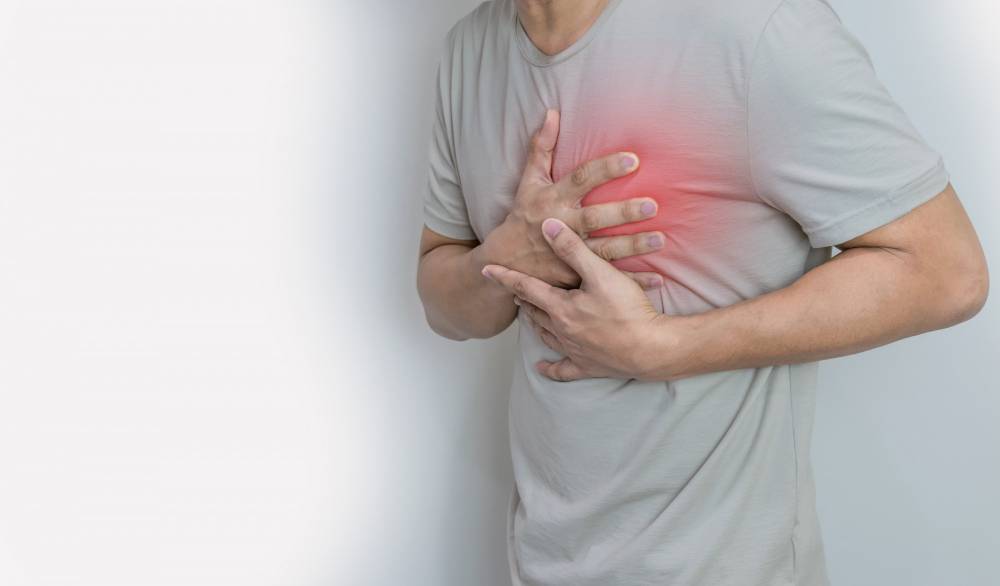Chest pain is a symptom that can strike fear into anyone experiencing it, and the discomfort can range from dull aches to a sharp stab, leaving many wondering whether it is a minor issue or a serious health threat. While some causes of chest pain are harmless, others can be life-threatening, so it’s important to understand the potential underlying conditions. At Capitol Cardiology Associates, we provide reliable vascular care services for our patients. Continue reading to explore various causes of chest pain so you can better recognize when to seek medical attention from a local heart doctor.
Burning Sensation
Heartburn can cause chest pain, and it is often mistaken for something more serious. When stomach acid goes into your esophagus, it will likely create burning sensations in the chest and/or throat area. This can be triggered by certain foods, beverages, and lifestyle habits such as eating large meals, lying down after eating or consuming spicy foods, caffeine, and alcohol. The pain from heartburn can radiate up to the neck and throat. It is usually accompanied by a sour or bitter taste in the mouth. Unlike more serious causes of chest pain, heartburn can often be managed with over-the-counter antacids, dietary changes, and lifestyle modifications. However, if heartburn is frequent or severe, it could indicate gastroesophageal reflux disease, which is a chronic condition that requires medical treatment. Persistent heartburn should not be ignored, as it can lead to severe complications like esophageal ulcers or Barrett's esophagus.
Pressure and Tightness
Angina is another common cause of chest pain that develops from reduced blood flow to the heart muscle. This condition is often a symptom of coronary artery disease, which occurs if the arteries that deliver blood to your heart become narrowed or blocked by plaque. The pain associated with angina is typically described as pressure, squeezing, or tightness, and it may also radiate to the shoulders, jaw, arms, neck, or back. Angina can be triggered by exertion or emotional stress, and it usually subsides with rest or nitroglycerin medication. Stable angina will occur predictably with exertion and is relieved by rest. Unstable angina is more unpredictable, can occur at rest, and is a medical emergency as it may signal an impending heart attack. Anyone experiencing unstable angina should seek immediate medical attention.
Sudden Sharp Pain
A pulmonary embolism can be a potentially life-threatening condition that happens if a blood clot travels to a lung and blocks a pulmonary artery. This condition can cause sudden and severe chest pain that is usually described as a sharp or stabbing sensation that worsens with deep breaths, coughing, or physical activity. In addition to chest pain, other symptoms include shortness of breath, rapid heartbeat, dizziness, sweating, and coughing up blood. Risk factors for PE include prolonged immobility, recent surgery, cancer, and certain genetic conditions that affect blood clotting. Because pulmonary embolism can be fatal if not treated promptly, it is critical to seek emergency medical care from a cardiologist. Treatment typically involves anticoagulant medications to prevent further clotting and, in severe cases, procedures to remove the clot.
Muscle Strain
Costochondritis is an often-overlooked cause of chest pain arising from inflammation of the cartilage that connects the ribs to the breastbone. This condition can result from physical strain, injury, or overuse, and it is more common in people who engage in repetitive activities or heavy lifting. The pain from costochondritis is typically sharp and localized to the front of the chest, and it can be exacerbated by certain movements, deep breathing, or pressing on the affected area. While the pain can be intense, costochondritis is generally not a serious condition and is managed with rest, anti-inflammatory medications, and physical therapy. In some cases, costochondritis can be confused with other causes of chest pain, so it’s important to receive a proper diagnosis from your provider. If you experience chest pain that does not improve with rest or is accompanied by other symptoms such as fever, shortness of breath, or radiating pain, seek medical attention.
Are You Searching for a Local Cardiologist?
Whether your chest pain is due to heartburn, angina, pulmonary embolism, or costochondritis, recognizing the symptoms and seeking timely medical care is a priority. If you ever experience sudden, severe, or unexplained chest pain, reach out to a heart doctor as soon as possible. At Capitol Cardiology Associates, we are dedicated to providing comprehensive cardiac care. Our team of experienced cardiologists is here to help diagnose and treat any heart-related concerns you may have. Don't wait until it's too late. Schedule an appointment with us today.






